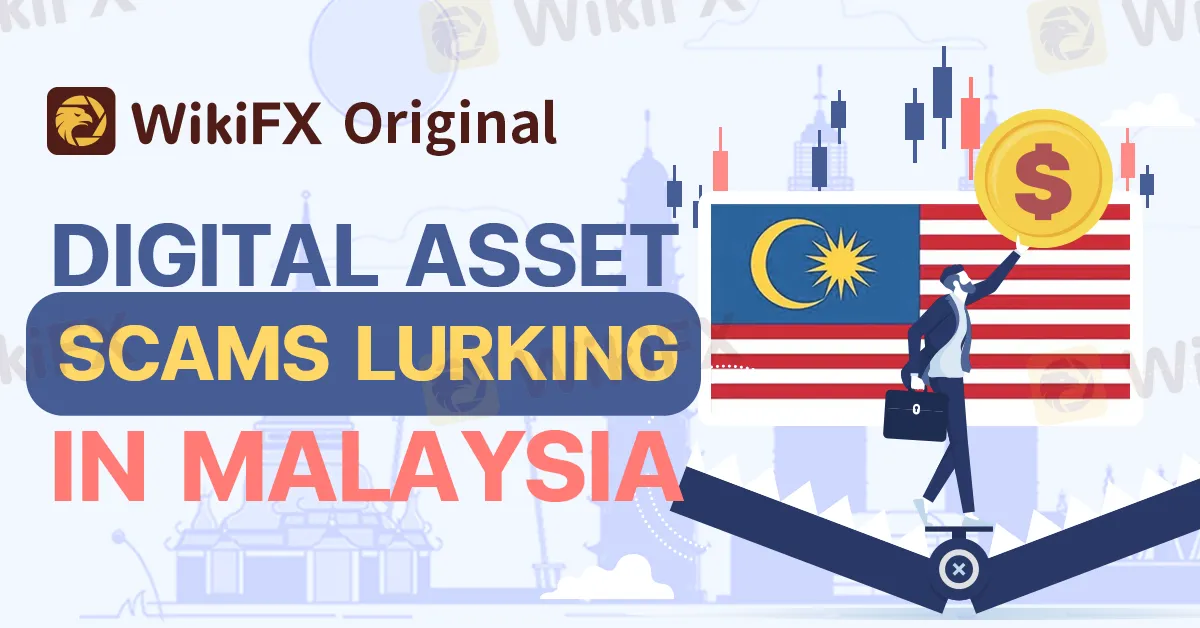简体中文
繁體中文
English
Pусский
日本語
ภาษาไทย
Tiếng Việt
Bahasa Indonesia
Español
हिन्दी
Filippiiniläinen
Français
Deutsch
Português
Türkçe
한국어
العربية
Digital Asset Scams Lurking In Malaysia
Abstract:Similar to conventional financial scams, cryptocurrency scams target your crypto assets rather than your money.

Many of the techniques used by financial criminals are also used by cryptocurrency scammers, such as pump-and-dump schemes that convince investors to buy a product by inflating its value or outright attempts to steal digital assets.
The latter kind of scam can entail accessing a victim's cryptocurrency wallet or convincing an investor to transmit a digital asset as payment for a fictitious transaction.
It is always the intention to use coercion to get the victim to reveal personal information or send priceless digital assets, like non-fungible tokens (NFTs), to the perpetrator's account.
Why, despite the numerous headline-grabbing stories about cryptocurrency scams that have appeared both nationally and internationally, are they still on the rise in Malaysia?
The alluring and quick return on investment may be the cause of this. Success tales of people who were fortunate enough to make money from this investment inspired others to follow in their footsteps.
After all, cryptocurrency investments are legitimate and do exist. The Bank Negara Malaysia (BNM) Financial Sector Blueprint 2022–2026 and Malaysia Fintech Report 2022 both highlight the huge potential in Malaysia as our financial sector rapidly adopts Fintech and digitalization.

• Examine the risk, return, and investment model to determine whether it is rational.
• Whether a cryptocurrency investment is permitted, Muslims can review the Fatwa that has been issued on the subject and see if there are any conditions under which it is prohibited. The Shariah Advisory Council (SAC) has numerous further recommendations for Islamic investments.
• When in doubt, you can inquire about the licencing status of a local or foreign investment company or find out if there have been any recent warnings issued regarding cryptocurrency investments by contacting the Compliance Officer from Bank Negara Malaysia, Securities Commission Malaysia (SC), Ministry of Domestic Trade and Consumer Affairs, Cybersecurity Malaysia, or other relevant authorities.

• If you realised you had been conned, you shall report it to the National Scam Response Centre (NSRC) and give the authorities the pertinent information.
• To see if the bank account number of the investment account is associated with any records of police reports, visit the website of the Royal Malaysian Police Commercial Crime Investigation Department, which is backed by Bank Negara Malaysia (BNM), the Ministry of Domestic Trade and Consumer Affairs (MDTCA), as well as the Ministry of Communication and Multimedia Commission (MCMC).
• The bank officers may halt a transaction when the amount is suspicious in order to perform their due diligence. If a bank officer advises you not to move forward with the transaction without providing a justification, heed their warning. They typically know the fundamental information about the account you were sending money to. If you have transferred the funds but then regretted it, call the bank right away to reverse it.
No matter you are a forex trader or a crypto trader, WikiFX is the app that every trader needs in their mobile phone. We are a global forex broker regulatory query platform that stores verified information of over 41,000 brokers providing online trading services. Ensuring the safety of your trading funds and journey is our ultimate duty!

Disclaimer:
The views in this article only represent the author's personal views, and do not constitute investment advice on this platform. This platform does not guarantee the accuracy, completeness and timeliness of the information in the article, and will not be liable for any loss caused by the use of or reliance on the information in the article.
Read more

Vanuatu Passes VASP Act to Regulate Crypto and Digital Assets
Vanuatu's new VASP Act regulates crypto businesses, enforcing strict licensing, AML/CFT compliance, and investor protections.

Should You Beware of Forex Trading Gurus?
Know the reality behind forex trading gurus, examining their deceptive tactics, inflated promises, and the risks associated with trusting them for financial advice.

Blockchain Decentralization: Empowering a Trustless Future
In recent years, blockchain technology has rapidly evolved from a niche innovation behind Bitcoin into a transformative force across industries. At its core, blockchain decentralization refers to the distribution of authority and decision-making away from a central entity and into the hands of a distributed network of participants. This shift redefines how data is stored and verified and paves the way for trustless, transparent, and resilient systems that challenge traditional centralized models.

Why the SEC Rejected the First U.S. Bank-Issued Stablecoin
The SEC rejected the first U.S. bank-issued stablecoin, citing regulatory concerns. This decision highlights the ongoing challenges in crypto asset classification and oversight.
WikiFX Broker
Latest News
FCA Warns Against 10 Unlicensed or Clone Firms
CySEC Warns Against 14 Unlicensed Investment Websites
Top Currency Pairs to Watch for Profit This Week - March 31, 2025
Will natural disasters have an impact on the forex market?
Philippines Deports 29 Indonesians Linked to Online Scam Syndicate in Manila
Exposing the Top 5 Scam Brokers of March 2025: A Closer Look by WikiFX
Gold Prices Climb Again – Have Investors Seized the Opportunity?
Webull Launches SMSF Investment Platform with Zero Fees
Australian Regulator Warns of Money Laundering and Fraud Risks in Crypto ATMs
The Withdrawal Trap: How Scam Brokers Lure Victims into Paying More
Currency Calculator







